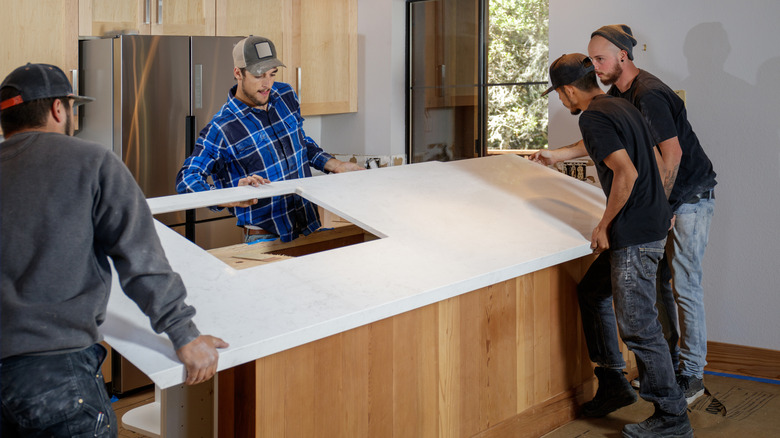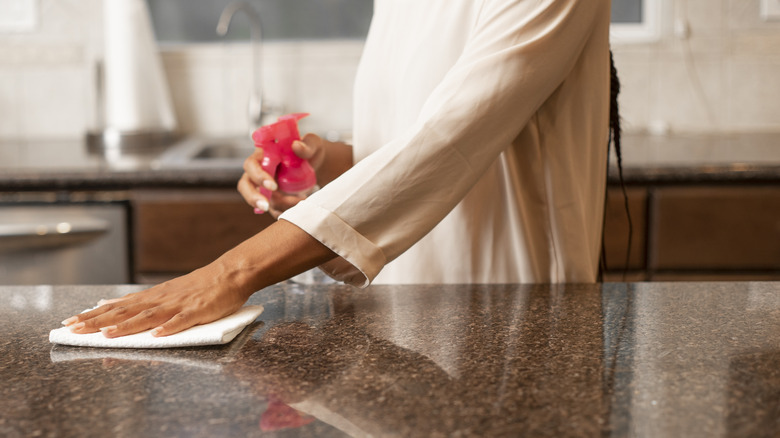How Often Should You Be Sealing Your Marble Countertops?
The cost of putting in marble countertops is quite significant, so you want to make sure that you receive the full value for your investment. An option for lengthening the lifespan of the marble involves caring for it properly, potentially giving you 50 years or more of life, even though most manufacturers guarantee them for 20 years. Part of the issue that shortens the lifespan of marble is its porosity, which means it can stain more easily than many people realize. Protection against this porosity is especially important in a kitchen, where spills occur regularly. Sealing your marble countertops regularly, at least twice a year, gives you more time to clean up spills before they can stain and ruin your investment. Lighter-colored countertops may need sealing as often as four times per year.
It's important to note that sealing marble doesn't cause liquid spills to bead up and sit atop the countertop. Sealing cannot change the porosity of the material, which means staining could still occur. However, sealing gives you more time to clean up the spill by preventing the liquid from penetrating the stone as quickly.
Additionally, the sealant often provides protection against suffering damages should the material come into contact with acidic substances. Acid causes etching to occur in marble, where the stone ends up with tiny gouges and scratches through a reaction. Acidic substances are common in kitchens, such as with many fruit juices, as well as lemons, apples, vinegar, tomatoes, and alcoholic beverages.
How to determine when and how often you should seal your marble countertop
Sealing your marble countertop is something you should do at the time of installation. You then can repeat the sealing process every three to six months. Darker marble does a better job at hiding stains and etching marks, meaning you probably can apply it about every six months. If you have a lighter color in your material, or if it doesn't have a heavy presence of patterns that can help to hide stains and scratches, you may need to apply the sealant every three months.
You may need to do the process even more often if you constantly use the kitchen for cooking, potentially exposing the material to acidic substances that could stain or damage it. If you cook every day or even multiple times per day, sealing the stone every couple of months can be a good idea.
You also can run a test with water on the marble to determine whether it's time to seal it again. Place a tablespoon or two of water out of the kitchen faucet on the stone countertop. Let it sit for about 10 minutes before wiping it up. If the marble is slightly darker in the area where the water was, it's time to apply sealant again.
Best techniques for applying sealant to marble countertops
If you decide to seal your marble countertops, you can do it yourself or hire a countertop installation team to do the application. Many times, the company that installed your countertop will seal it at the time of installation. This same company can probably return to your kitchen a few times a year to seal the marble for you.
If you hire a professional to apply the sealant for you, expect to pay $100 to $200 per application, depending on the size of the marble. The price may go up a little bit if you also have a backsplash consisting of the same material. If you are choosing to do the work on your own, you can expect to pay around $25 for a sealant product. However, you should be able to use the product multiple times, so you'll save quite a bit of money by doing the work yourself.
To apply it yourself, start by cleaning the marble thoroughly. If you notice residue on the material, be certain to remove it, carefully using a razor blade as necessary. Use painter's tape to keep the sealant from ending up on walls or on the cooking surface of the oven. Spray the liquid on the marble or apply it with a foam brush. Allow it to sit for about 15 minutes before wiping away any excess liquid. Don't use the marble for at least 30 minutes afterward.


